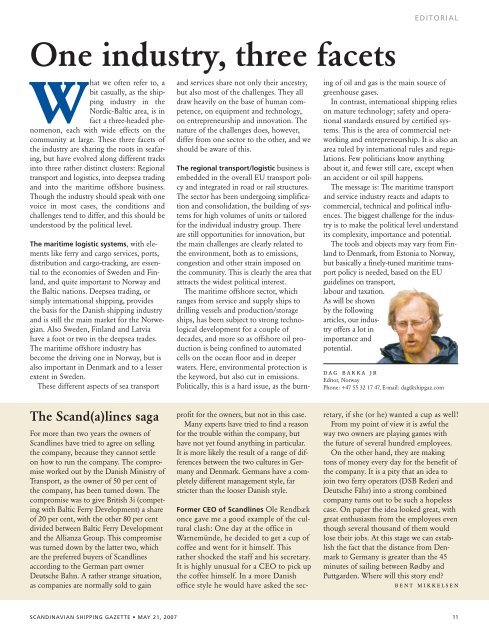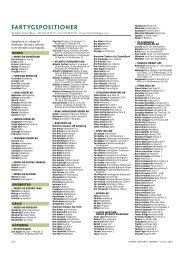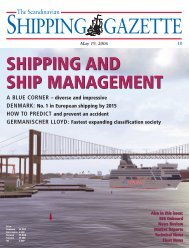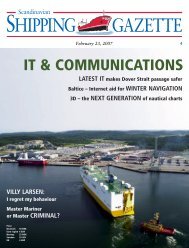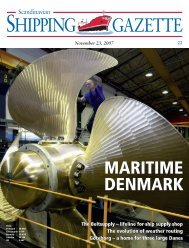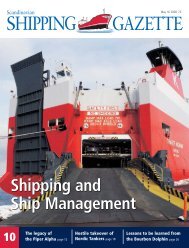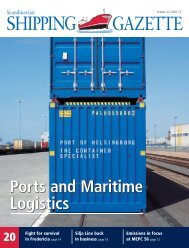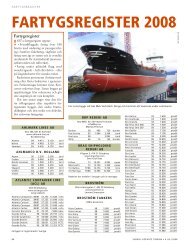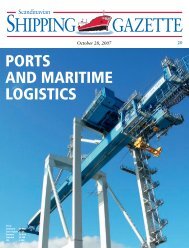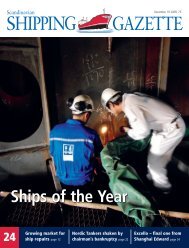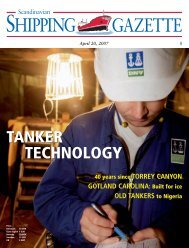SSG No 10 - Shipgaz
SSG No 10 - Shipgaz
SSG No 10 - Shipgaz
You also want an ePaper? Increase the reach of your titles
YUMPU automatically turns print PDFs into web optimized ePapers that Google loves.
One industry, three facets<br />
What we often refer to, a<br />
bit casually, as the shipping<br />
industry in the<br />
<strong>No</strong>rdic-Baltic area, is in<br />
fact a three-headed phenomenon,<br />
each with wide effects on the<br />
community at large. These three facets of<br />
the industry are sharing the roots in seafaring,<br />
but have evolved along different tracks<br />
into three rather distinct clusters: Regional<br />
transport and logistics, into deepsea trading<br />
and into the maritime offshore business.<br />
Though the industry should speak with one<br />
voice in most cases, the conditions and<br />
challenges tend to differ, and this should be<br />
understood by the political level.<br />
The maritime logistic systems, with elements<br />
like ferry and cargo services, ports,<br />
distribution and cargo-tracking, are essential<br />
to the economies of Sweden and Finland,<br />
and quite important to <strong>No</strong>rway and<br />
the Baltic nations. Deepsea trading, or<br />
simply international shipping, provides<br />
the basis for the Danish shipping industry<br />
and is still the main market for the <strong>No</strong>rwegian.<br />
Also Sweden, Finland and Latvia<br />
have a foot or two in the deepsea trades.<br />
The maritime offshore industry has<br />
become the driving one in <strong>No</strong>rway, but is<br />
also important in Denmark and to a lesser<br />
extent in Sweden.<br />
These different aspects of sea transport<br />
The Scand(a)lines saga<br />
For more than two years the owners of<br />
Scandlines have tried to agree on selling<br />
the company, because they cannot settle<br />
on how to run the company. The compromise<br />
worked out by the Danish Ministry of<br />
Transport, as the owner of 50 per cent of<br />
the company, has been turned down. The<br />
compromise was to give British 3i (competing<br />
with Baltic Ferry Development) a share<br />
of 20 per cent, with the other 80 per cent<br />
divided between Baltic Ferry Development<br />
and the Allianza Group. This compromise<br />
was turned down by the latter two, which<br />
are the preferred buyers of Scandlines<br />
according to the German part owner<br />
Deutsche Bahn. A rather strange situation,<br />
as companies are normally sold to gain<br />
and services share not only their ancestry,<br />
but also most of the challenges. They all<br />
draw heavily on the base of human competence,<br />
on equipment and technology,<br />
on entrepreneurship and innovation. The<br />
nature of the challenges does, however,<br />
differ from one sector to the other, and we<br />
should be aware of this.<br />
The regional transport/logistic business is<br />
embedded in the overall EU transport policy<br />
and integrated in road or rail structures.<br />
The sector has been undergoing simplification<br />
and consolidation, the building of systems<br />
for high volumes of units or tailored<br />
for the individual industry group. There<br />
are still opportunities for innovation, but<br />
the main challenges are clearly related to<br />
the environment, both as to emissions,<br />
congestion and other strain imposed on<br />
the community. This is clearly the area that<br />
attracts the widest political interest.<br />
The maritime offshore sector, which<br />
ranges from service and supply ships to<br />
drilling vessels and production/storage<br />
ships, has been subject to strong technological<br />
development for a couple of<br />
decades, and more so as offshore oil production<br />
is being confined to automated<br />
cells on the ocean floor and in deeper<br />
waters. Here, environmental protection is<br />
the keyword, but also cut in emissions.<br />
Politically, this is a hard issue, as the burn-<br />
profit for the owners, but not in this case.<br />
Many experts have tried to find a reason<br />
for the trouble within the company, but<br />
have not yet found anything in particular.<br />
It is more likely the result of a range of differences<br />
between the two cultures in Germany<br />
and Denmark. Germans have a completely<br />
different management style, far<br />
stricter than the looser Danish style.<br />
Former CEO of Scandlines Ole Rendbæk<br />
once gave me a good example of the cultural<br />
clash: One day at the office in<br />
Warnemünde, he decided to get a cup of<br />
coffee and went for it himself. This<br />
rather shocked the staff and his secretary.<br />
It is highly unusual for a CEO to pick up<br />
the coffee himself. In a more Danish<br />
office style he would have asked the sec-<br />
EDITORIAL<br />
ing of oil and gas is the main source of<br />
greenhouse gases.<br />
In contrast, international shipping relies<br />
on mature technology; safety and operational<br />
standards ensured by certified systems.<br />
This is the area of commercial networking<br />
and entrepreneurship. It is also an<br />
area ruled by international rules and regulations.<br />
Few politicians know anything<br />
about it, and fewer still care, except when<br />
an accident or oil spill happens.<br />
The message is: The maritime transport<br />
and service industry reacts and adapts to<br />
commercial, technical and political influences.<br />
The biggest challenge for the industry<br />
is to make the political level understand<br />
its complexity, importance and potential.<br />
The tools and objects may vary from Finland<br />
to Denmark, from Estonia to <strong>No</strong>rway,<br />
but basically a finely-tuned maritime transport<br />
policy is needed, based on the EU<br />
guidelines on transport,<br />
labour and taxation.<br />
As will be shown<br />
by the following<br />
articles, our industry<br />
offers a lot in<br />
importance and<br />
potential.<br />
dag bakka jr<br />
Editor, <strong>No</strong>rway<br />
Phone: +47 55 32 17 47, E-mail: dag@shipgaz.com<br />
retary, if she (or he) wanted a cup as well!<br />
From my point of view it is awful the<br />
way two owners are playing games with<br />
the future of several hundred employees.<br />
On the other hand, they are making<br />
tons of money every day for the benefit of<br />
the company. It is a pity that an idea to<br />
join two ferry operators (DSB Rederi and<br />
Deutsche Fähr) into a strong combined<br />
company turns out to be such a hopeless<br />
case. On paper the idea looked great, with<br />
great enthusiasm from the employees even<br />
though several thousand of them would<br />
lose their jobs. At this stage we can establish<br />
the fact that the distance from Denmark<br />
to Germany is greater than the 45<br />
minutes of sailing between Rødby and<br />
Puttgarden. Where will this story end?<br />
bent mikkelsen<br />
SCANDINAVIAN SHIPPING GAZETTE • MAY 21, 2007 11


